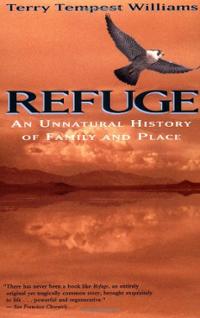10 February 2014
Refuge, by Terry Tempest Williams
Posted by Callan Bentley
 When Michael Collier came to visit last year, he recommended a couple of books to me. I finally got around to reading the first of them – Refuge, a memoir mixed with natural history of Utah by Terry Tempest Williams.
When Michael Collier came to visit last year, he recommended a couple of books to me. I finally got around to reading the first of them – Refuge, a memoir mixed with natural history of Utah by Terry Tempest Williams.
The arc of the story is essentially twofold: the women in Williams’ family get cancer, and get treated for cancer (mastectomies, chemo, nutritional supplements to negate the nausea of the disease’s final stages), and they die. At the same time, the Great Salt Lake fills up to overflowing, drowning Williams’ favorite wildlife refuge, a place where she (and her family) appreciate going and seeing the birds. The homeostasis of the women’s bodies is out of whack, and so is the ratio of rain and evaporation that keeps the lake level constant. That analogy – nature and family out of balance – is the double-threaded core of the book.
Each of the chapters is titled with the name of a bird, rather than a number. Some of these connections are explicitly made – with the poor burrowing owls near the beginning, for instance, but others seem pretty tenuous – a brief mention of no real narrative use to the particular chapter. The lake level’s elevation is also noted prominently, although it’s hard to connect with these numbers (4204′ to 4211′ is the range). I suppose that’s meant to quantify the mounting sense of crisis, but from my perspective, it’s hard to tell what real difference 4206 has over 4205. Much more effective are her thoughtfully constructed anecdotes of what the lake does as it swamps the wildlife refuge: stories of people in nature having personal realizations about the world. It is in those moments of insight that the book is at its strongest.
Williams is a feminist and a Mormon. If you think that’s an oxymoron, you should realize she sees herself as culturally Mormon, but not a fundamentalist or a bright-eyed zealot. She was raised in Utah (and, as it turns out, is a Romney descendant – a cousin of the former presidential candidate). And her tough mother, the most intriguing character in the book, models independent thought for her children. Williams thinks for herself, and this allows her to both explore her connection with the natural world and the fact that she is a person in her own right, capable of embracing parts of Mormon culture, and leaving other ideas aside as invalid, destined only for the dustbin of history.
Some of my favorite moments and bits: Staring up at the stars, she quotes a friend who says “City lights are a conspiracy against higher thought.” That rang true for me – it’s a profound thing to stare out into the night sky, to ponder the age of the stars. Seeing the stars again at night is one of the huge benefits I’ve realized from my move a year and a half ago from DC to the Fort Valley. I look up at night and receive photons on my retina – photons that have just expired inside my eyeball after traipsing across the universe for billions of years. It’s an astonishing thing, which brings out in me a sense of my own insignificance in the grand scheme of things. I find that liberating, though others find their unimportance terrifying. Some see God in those vast reaches, others a total absence of anything godlike. Either way: Wow.
Here’s another moment where Terry Tempest Williams taps into a universal truth (p. 160):
Peeling an orange is a good thing to do in the mountains. It slows you down. You bite into the tart rind, pull it back with your teeth and then let your fingers undress the citrus. Nothing else exists beyond or before this task. The naked fruit is in your hands waiting for the sections to be separated. Halves. Quarters. And then the delicacy of breaking the orange down to its smallest smile.
Isn’t that beautiful? Isn’t that true? Boy, if a writer gives me a few transcendent moments like that in the course of a book, they’ve got my attention all the way through.
Terry Tempest Williams reminds me of one of my favorite authors, Edward Abbey. But where Abbey is rough, Williams is smooth. Where Abbey is cantankerous, Williams is considerate. Both relish life amid the wonder of the desert. Both celebrated Utah’s wild places. And both seem to tap into the same vein of natural philosophy (in the modern sense of the phrase). While there are topics that each write about that don’t speak to me, the visceral authenticity of key passages will keep me reading, looking for more.
I was impressed with Refuge, and I know I’ll be adding the rest of Williams’ canon to my list of books to read.


 Callan Bentley is Associate Professor of Geology at Piedmont Virginia Community College in Charlottesville, Virginia. He is a Fellow of the Geological Society of America. For his work on this blog, the National Association of Geoscience Teachers recognized him with the James Shea Award. He has also won the Outstanding Faculty Award from the State Council on Higher Education in Virginia, and the Biggs Award for Excellence in Geoscience Teaching from the Geoscience Education Division of the Geological Society of America. In previous years, Callan served as a contributing editor at EARTH magazine, President of the Geological Society of Washington and President the Geo2YC division of NAGT.
Callan Bentley is Associate Professor of Geology at Piedmont Virginia Community College in Charlottesville, Virginia. He is a Fellow of the Geological Society of America. For his work on this blog, the National Association of Geoscience Teachers recognized him with the James Shea Award. He has also won the Outstanding Faculty Award from the State Council on Higher Education in Virginia, and the Biggs Award for Excellence in Geoscience Teaching from the Geoscience Education Division of the Geological Society of America. In previous years, Callan served as a contributing editor at EARTH magazine, President of the Geological Society of Washington and President the Geo2YC division of NAGT.
Callan, Glad you discovered TTW. Refuge is truly one of the best natural history/nature writing books ever written. Her passion, voice, and humanity sing true on every page. Hope you enjoy her other books. All best, David